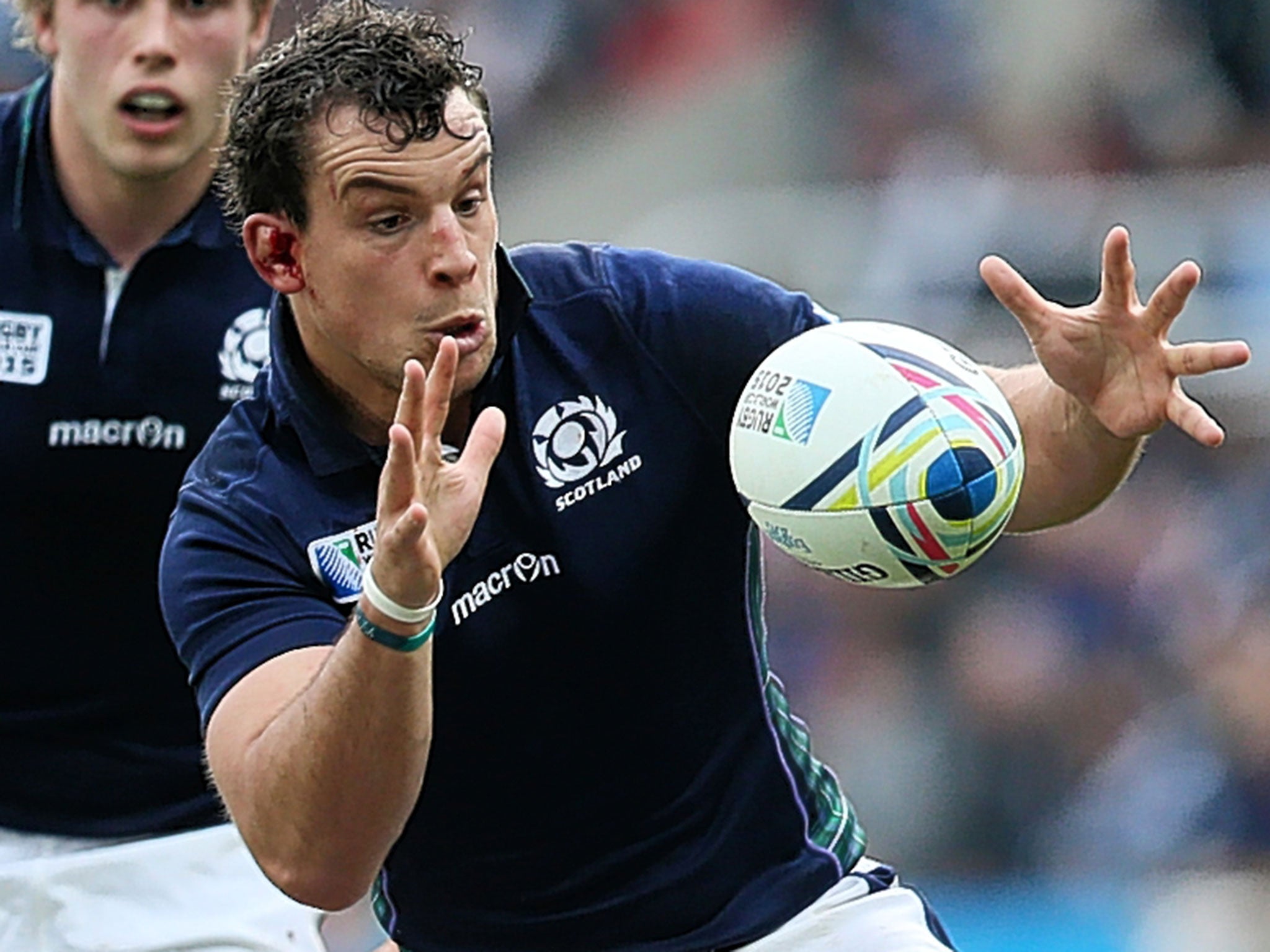Australia vs Scotland RWC 2015: John Hardie the Kiwi convert plays for his future
Scotland flanker has a big decision to make after the World Cup

At least John Hardie knows what is happening today. That is more than he did when he first set foot in Scotland three months ago and more than he will tomorrow should Scotland lose to Australia here at Twickenham this afternoon and thereby leave the World Cup.
Hardie, Scotland’s open-side flanker, arrived from New Zealand during the summer on something of a wing and a prayer. Should the Scots pull off what most outside observers agree would be an unlikely victory, then he has another settled week ahead of him. Otherwise he will have to sit down soon with his advisors and contemplate his immediate future as a professional rugby player – that is to say, where, and for whom, he will ply his trade.
“Hopefully something will pop up,” Hardie, 27, said after his man-of-the-match performance against Samoa eight days ago, though he has admitted he could be playing in Scotland and, given that the SRU fund the two professional entities in Glasgow and Edinburgh, Vern Cotter, the head coach, should be allowed to place him handily.
Hardie is, though, in the grandest shop window possible. “Who would have thought six months ago I’d be involved in a World Cup quarter-final at Twickenham?” he asked. Certainly not his parents, Helen and Russell, who have left the family sheep farm at the tiny hamlet of Dipton near the bottom of New Zealand’s South Island to follow their son’s fortunes during the tournament.
The pedigree sought by Cotter stems from Southland. Russell Hardie represented that province as a midfield player and John grew up as a centre himself. Not until he reached Southland Boys High School did he change to the back row, the prime local example for which was Paul Henderson, the Southland flanker who would have won far more caps for New Zealand during the 1990s but for the presence in the All Blacks of Josh Kronfeld.
Southland gave Hardie his first game in 2007 aged 18 and he helped them to Ranfurly Shield success in 2010 and 2011. The Highlanders, the Super Rugby franchise based in Dunedin, recognised him in 2010 and, five years later, they were contesting the final with the Hurricanes (though Hardie missed the game with a rib injury).
But neither Southland nor the Highlanders were near the top of the domestic tree when Hardie joined them. He and they have had to graft for their success, just as Scotland have to in the modern era to sustain a place at the top table of rugby.
The Hardies were aware of the Scottish connection through Christine Lumsden, the player’s grandmother, who left Fife in 1925. When Cotter took over the coaching reins, he knew he needed a No 7 with qualities as a ball winner on the ground and as a link with the backs. “We felt that John gives us that specialist role and we have other players who have the versatility to cover if necessary,” Cotter said. Today, he has paired Hardie with Blair Cowan.
“Scotland has always played its rugby through the back row because we need the ball quickly,” Sir Ian McGeechan, former coach to Scotland and the Lions, said. “We look at No 7s in a different way to England, who have historically not produced them. You have exceptions like Peter Winterbottom and Neil Back but generally England’s back row is a different shape.
“Hardie’s arrival has increased the competition in Scotland’s back row,. The way Scotland play and the mobility of their forwards will challenge Australia in a different way and could make for a fascinating game.”
Fourteen years ago McGeechan was where Cotter is now, introducing at short notice a Kiwi to bolster Scottish ranks. Brendan “Chainsaw” Laney arrived in 2001 to play full-back and spent four years in blue; he, too, was from Southland and Hardie turned to Laney for advice when he was contemplating his move.
There was no guarantee that it would result in an international call but now Hardie has four caps and a crack at glory. “It’s not a bad thing to be an underdog,” he said. “We can’t worry too much about Aussie, we only have one chance, we have to hit the ground running.”
Subscribe to Independent Premium to bookmark this article
Want to bookmark your favourite articles and stories to read or reference later? Start your Independent Premium subscription today.

Join our commenting forum
Join thought-provoking conversations, follow other Independent readers and see their replies